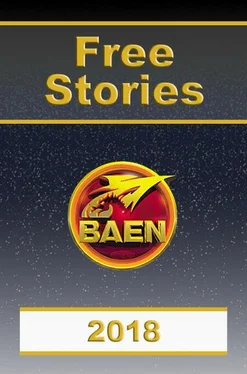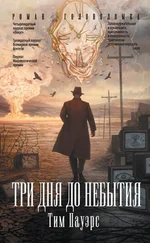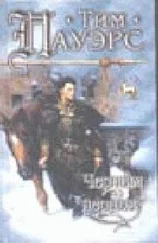Not by timer.
Not by a remote switch.
Not by anything electronic.
But mechanically, using Mark II eyeballs and hands.
If the mission was successful, it meant a destroyed Dome and lots of dead Creepers.
But it also meant two or three dead humans as well.
Suicide mission.
But the Russians being the Russians, some were prepared to pay the ultimate price.
And now they were coming here to Long Island.
“Sergeant Hart?”
“Ma’am?” I realized she had just spoken and I hadn’t heard what she had said.
“Did you hear what I just said?”
Decisions, decisions.
I decided to throw myself on the mercy of my superior officer and confess the truth.
“Ma’am, I’m afraid I didn’t.”
“Late for the briefing, not hearing a word that I uttered,” she said, shaking her head. “A hell of a way to start the day.”
“Yes, ma’am.”
“You’re one sloppy NCO, aren’t you.” It wasn’t really a question.
“The sloppiest, ma’am.”
“But you also happen to be one of my smartest, which helps. Sometimes. Don’t push it.”
“No, ma’am.”
She referred to another piece of paper. “What did you have for breakfast this morning?”
“Ah… I was running late, ma’am. Didn’t have breakfast.”
“Major Glenn reports that you’ve vomited blood twice in the last week.”
I didn’t reply to my boss.
What could I say?
She said, “How are you holding up?”
“Fine, ma’am.”
“You’re probably lying to me, Sergeant Hart.”
“It’s a possibility, ma’am.”
She stared at me with her brown eyes and I saw something there that was not usual.
Sympathy.
“When the time comes,” she said, “we’ll change your duty status.”
“If you say so, ma’am.”
“I do so.”
“Thank you, ma’am.”
The lieutenant picked up another sheet of paper, a thin light yellow message flimsy, and she said, “You were stationed at Fort Saint Paul in New Hampshire three years ago, correct?”
“Yes, ma’am.”
“And served in a Ranger Recon platoon with a Randy Knox?”
A slight smile at the memory of being at that platoon and Knox’s silly but very capable Belgian Malinois named Thor.
“That’s right,” I said. “Sergeant Knox.”
“It’s now Lieutenant Knox,” she said.
“Great,” I said, feeling just the tiniest bit jealous of him earning his lieutenant’s bars before me.
“Not so great,” she said, putting the message flimsy down. “Got last quarter’s casualty reports this morning. He’s listed MIA after an ambush in Connecticut.”
“Connecticut?” I asked, hoping for a mistake. “Last I knew, he was still stationed in New Hampshire. What was he doing in Connecticut?”
“Getting ambushed,” she says. “He was part of a convoy, heading east to Massachusetts when they were attacked by a band of Creepers. Most of the convoy was destroyed. Knox was listed MIA. Sorry.”
I took a breath. Losing friends and family members was nothing new in this ever-constant war, but one tried not to get used to it. And I wasn’t going to fool myself by hoping he was, indeed, missing. Not in this time, not in this war. In a very few instances, being listed as MIA was a way of a soldier deserting into the wild and not being listed as being absent without leave. But most times it was a way of facing reality, that in a war when we humans faced lasers, flame weapons, rods from God and kinetic energy weapons, sometimes there were no remains or dog tags left behind.
So Knox was MIA.
Poor Randy. At some point, years from now, some overworked and undermanned graves registration unit might find a charred bone or two, tangled up in his dog tags, and that would be that.
Dogs.
I hoped his Thor had made it.
“Sergeant Hart?”
“Ma’am?” I replied, knowing I had been caught again, not paying attention.
“Your visitors are arriving at approximately oh nine-hundred tomorrow, at Hempstead Harbor. Be there.”
“Yes, ma’am.”
“Dismissed.”
The next morning I was standing at one of the floating docks making up the Hempstead Harbor structure. Pre-war there were lots of harbors scattered along Long Island, but the invading Creepers had dropped asteroids in oceans, lakes and rivers, causing artificial tsunamis. That meant a lot of cities around the world were drowned, and places like Long Island were pretty much scoured clean, and any surviving ports were tumbled places of junk from broken docks to boat hulks.
That meant most harbors were artificial, built with floating docks, and the one I was on took care of this part of Long Island. Fishing boats of all kinds were moored on two long docks, and the third dock I was on belonged to the Navy, as small as it was.
Out on the waters there was a distant haze masking the Connecticut coastline, and among the fishing vessels out there was a steam-vessel of some sort—it looked like it had once bore masts—and at the stern of the craft a flag was slowly waving in the steady breeze. It had three stripes—white, blue and red—and in the corner was a yellow square with a double-headed eagle.
One of the Navy’s harbormasters came up to me, and she said, “Looks like our Russian friends have arrived.”
The harbormaster was cute, wearing a khaki blouse and pants, and a blue baseball cap covering her blonde hair. She seemed to be about my age, 16 or so. Per her nametag, her name was COOK.
“What’s the flag?”
She had a pair of binoculars hanging from a leather strap around her neck, and brought them up. One of the lenses was missing.
“Russian Imperial flag,” she said. “The Russians now have a czar again.”
Two launches slipped out from the dock, being rowed by six crewmen each, and in a few minutes, they were coming back, the boats riding lower in the water. There were large containers in the center of the first boat, and two passengers riding in the rear, and four other Russians in the other.
“This way,” the harbormaster said, and I followed her to the end of the dock. The first launch came around and there was a flurry of lines being tossed, oars being raised, and a couple of beefy guys managed to unload the containers—made out of scuffed black plastic—and then two individuals stepped out, wearing dark blue uniforms of a type I had never seen before, with garrison caps with badges on their heads. The near individual was a heavy-set man, with a big smiling face and close-cropped hair. He turned and spoke to the person behind him, who turned out to be a young Russian woman, and she smiled at me, and I fell in love at that very moment.
She quickly walked up to me and extended her hand, which I quickly shook. She was about my height, wearing the same uniform as her male comrade, but she looked nothing like her fellow officer. She was slim, pretty, with bobbed blonde hair, wide smile, blue eyes, and clear skin.
“Good day,” she said, speaking fine English with a Russian accent.
“Hi,” I said, knowing, at that moment, I sounded like a moron.
She let me hand go, gestured to her companion. “This is Senior Lieutenant Kosanskey, Imperial Russian Navy.”
He smiled, saluted, and I saluted back, realizing that while these two had probably traveled for weeks across the Atlantic and looked like a Russian Navy recruiting poster, I was dressed in mended and slightly dirty Army fatigues.
He said something quickly in Russian, and the woman said, “Yuri extends his deepest greetings in fraternal thanks to the American Army. I’m sorry, he doesn’t speak English.”
“That’s all right, I don’t speak Russian.”
“Ah,” she said, “my apologies. “Captain Lieutenant Ludmilla Petrov. Glad to meet your acquaintance.”
Читать дальше








![Тим Пауэрс - Последние дни. Том 2 [litres]](/books/393813/tim-pauers-poslednie-dni-tom-2-litres-thumb.webp)
![Тим Пауэрс - Последние дни. Том 1 [litres]](/books/394090/tim-pauers-poslednie-dni-tom-1-litres-thumb.webp)
![Тим Пауэрс - Последний выдох [litres]](/books/402145/tim-pauers-poslednij-vydoh-litres-thumb.webp)